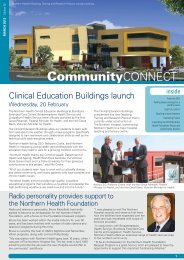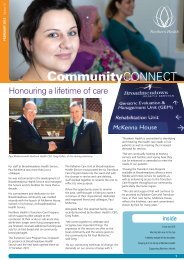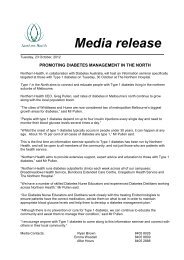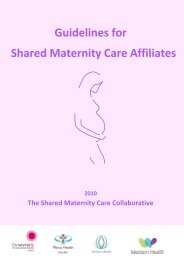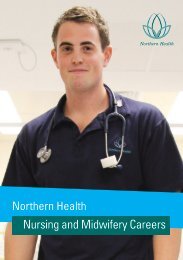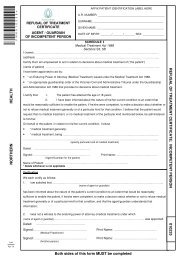ANNUAL REPORT - Northern Health
ANNUAL REPORT - Northern Health
ANNUAL REPORT - Northern Health
Create successful ePaper yourself
Turn your PDF publications into a flip-book with our unique Google optimized e-Paper software.
demonstrate the importance of collaboration between<br />
health services to provide access for the community. The<br />
completion of the upgrade of the existing 25-bed ward will<br />
take the total number of beds to 50, one of the biggest<br />
mental health facilities in the state.<br />
The new unit includes single bedrooms with ensuite facilities,<br />
three separate wings which will meet the special needs of<br />
women and adolescents, several smaller lounge areas with<br />
small courtyards rather than one large area for all patients<br />
and a family room for visitors.<br />
Improvements in access to Day Surgery at Broadmeadows<br />
<strong>Health</strong> Service has resulted in an increase in theatre<br />
scheduling from 68% in December 2009 to 91% in March<br />
2010. The implementation of the Department of <strong>Health</strong><br />
Elective Surgery Access Policy saw improvements in patient<br />
communication and overall elective surgery waiting list<br />
management.<br />
<strong>Northern</strong> <strong>Health</strong> also achieved a significant reduction in the<br />
overall surgical waiting list, including those patients waiting<br />
longer than the recommended waiting time. Strategies<br />
to help achieve this included early review of long waiting<br />
patients as outpatients. Plans are put in place to ensure<br />
timely surgery, case management of long waiting patients,<br />
better waiting list management and outsourcing some<br />
surgery to other surgical facilities.<br />
<strong>Northern</strong> <strong>Health</strong>’s Department of Cardiology has seen a large<br />
increase in activity and services throughout the past three<br />
years and following the commencement of a 24 hour, 365<br />
days a year service in late 2007. Demand by patients in the<br />
northern suburbs for local delivery of acute and ambulatory<br />
cardiac services has continued to grow rapidly.<br />
The cardiology outpatient department has doubled<br />
in size and now sees approximately 10,000 patients a<br />
year, with clinics offering expertise in general cardiology,<br />
electrophysiology (heart rhythm), pacemakers and heart<br />
failure, as well as a rapid access chest pain clinic. A new<br />
outpatient area was developed in 2009 to accommodate<br />
an ever increasing referral population which now sees<br />
cardiology clinics running every week day. Patients in<br />
Melbourne’s north no longer have to travel to inner city<br />
hospitals to access high quality outpatient cardiac services.<br />
Inpatient services have dramatically expanded over the past<br />
three years, most notably with the commencement of a<br />
regular Percutaneous Coronary Intervention (PCI) program<br />
(stenting coronary arteries for patients with angina and heart<br />
attack).<br />
The PCI service has developed to include a state of the art<br />
primary PCI service (emergency 24/7 treatment for heart<br />
attack victims). Time-to-treatment saves lives in patients<br />
having heart attacks, and new protocols developed in<br />
conjunction with the Ambulance Service and the Emergency<br />
Department have dramatically improved response times for<br />
these critically ill patients.<br />
This has seen an almost 1000% increase in volume from<br />
approximately four patients treated per month to 40 patients<br />
treated per month.<br />
Previously these patients were transferred to other facilities<br />
across Melbourne. Patients now benefit from reduced<br />
lengths of hospital stay and improved access for family and<br />
friends during their admission. The huge increase in demand<br />
for such services has seen the state government allocate<br />
$7.4m for a new cardiac precinct which will include two new<br />
cardiac catheter laboratories. This is due for completion in<br />
December 2011. All of the cardiologists at <strong>Northern</strong> <strong>Health</strong><br />
exceed minimum requirements set by the Cardiac Society<br />
of Australia and New Zealand (CASNZ) for accreditation to<br />
perform diagnostic and invasive cardiac procedures.<br />
Out of hours specialist staff are now alerted and mobilised<br />
even before the patient arrives at <strong>Northern</strong> <strong>Health</strong>. Rural<br />
hospitals including Bendigo, Kilmore, Echuca and Seymour<br />
have made use of this service, with patients being transferred<br />
directly via ambulance and even helicopter. The PCI service,<br />
including primary PCI, is formally monitored fortnightly with<br />
feedback to physicians, the Emergency department and<br />
Ambulance staff on a regular basis.<br />
Cardiac Rehabilitation services at <strong>Northern</strong> <strong>Health</strong> have<br />
needed to grow to meet local patient needs. A service at<br />
Craigieburn <strong>Health</strong> Service commenced in February 2008<br />
and due to high demand, a second Cardiac Rehabilitation<br />
program started in February 2010. The new program runs<br />
out-of-hours (6 – 8pm) to improve access for patients of<br />
working age who have difficulty attending during standard<br />
business hours.<br />
All patients have an individual assessment by a cardiac<br />
nurse and physiotherapist before joining the program where<br />
they set short and long term goals. A cardiac depression<br />
scale is also used to identify patients at risk and if required<br />
offered intervention. Education sessions are presented by<br />
a dietitian, cardiac nurse, social worker physiotherapist and<br />
include education about risk factor modification, healthy<br />
food options, medications, stress management, emotional<br />
reactions, pathology, exercise and returning to activity.<br />
Exercise is focused around aerobic and strengthening<br />
training and patients are encouraged to become<br />
independent with their own programs with assistance from<br />
the physiotherapist.<br />
09/10 <strong>Northern</strong> <strong>Health</strong> Annual Report 29



